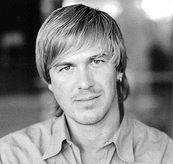
Photo: Thilo Beu
 pdf file
pdf file
 Photo: Thilo Beu |  pdf file pdf file
|
Jörg Waschinski, who was born in Berlin, represents the third generation of singers in the voice category of countertenors. He was the first male soprano to study with Prof. Renate Faltin at the Hochschule für Musik Hanns Eisler in Berlin. In 1996, Waschinski competed in the international Johann Heinrich Schmelzer competition and won the special award at the "Bundeswettbewerb" for singing in Berlin. The renowned singer is an exceptional phenomenon - not only because of his rare pitch of voice, but especially also because of his artistic competence that has brought him to an often sought after opera and concert singer throughout Europe.
The magazine, Opernwelt, named him the next generation singer of the season 1999/2000 and, already in the next season, he was nominated for his Nerone at the Bonn Opera as the best singer of the 2000/2001 season. Since then Waschinski has been a welcomed guest at all large opera houses and became a favourite of the public and the critics. The presumably lost roles of the legendary Baroque castratos also belong to his repertoire such as the works of the early Classics until the time of Mozart and also contemporary music. His engagements brought him together with well-known conductors such as Ton Koopman, Frieder Bernius, Reinhard Goebel, Michael Hofstetter, Jos van Veldhoven, John Fiore, and Christoph Spering and reputed directors like Philipp Himmelmann, Dietrich Hilsdorf, Georges Delnon, Franziska Severin or Frank-Patrick Steckel.
Successful concerts and performances with music from the Romantics, the modern, and contemporary music show that the singer is not limited to a particular epoch. In this manner Waschinski understands that he is pushing the limits, as in the scenic production of Kurt Weill's "Die Sieben Todsünden" (The Seven Deadly Sins) with star dancer, Gregor Seyffert, where Waschinski sang and danced the part of Anna I, in the spectacular performance of Robert Schumann's oratorio, "Das Paradies und die Peri", in the title role of Peri in the Tonhalle at Düsseldorf in 2004 or in the role of Bellino in the celebrated Casanova revue of the Friedrichstadtpalast in Berlin. In January 2008, Jörg Waschinski could be experienced in the part of the male super model Tarquin in the highly noticed world premiere of the opera The Fashion by Giorgio Battistelli.
In November and December 2008, Jörg Waschinski will appear with his Christmas programme "Die ihr schwebet" together with the harpist, Jane Berthe, in Nuremberg, Fürth, and Bonn. In addition, he can be heard as the only vocal soloist during the Christmas concerts of the Kölner Kammerorchester at the Philharmonie in Cologne and in Wiesbaden. Invited by the City Chamber Orchestra of Hongkong, he will travel to Hongkong in January 2009 with his Handel programme, and in February 2009 he will appear with a Handel cantata project by the director, Olaf Brühl, at the French Church in Berlin as well as in June and July 2009 at the Händel-Festspiele in Halle and Schloss Engers in Neuwied, respectively.
Among Jörg Waschinski's numerous CD recordings one should particularly mention the "Echo-Klassik-Preis" winning opera recording Endimione by Johann Christian Bach under Bruno Weil or the recording of the oratorio, Giob, by Carl Ditters von Dittersdorf under Hermann Max, which received the "Preis der Deutschen Schallplattenkritik". The first-time CD recording of Pergolesi's Stabat mater with two adult male voices, together with Michael Chance and the Kölner Kammerorchester under Helmut Müller-Brühl, was declared in 2006 as the reference recording by the BBC Music Magazine. At the beginning of 2009 a solo CD with lieder by Clara Schumann in an arrangement for string quartet will by released by Phoenix Edition in coproduction with Deutschlandradio Kultur as well as a CD with unpublished Handel cantatas by Farao. In addition, a further CDs will be published over the year, a solo CD with lieder by the American composer, Amy Beach, with the Meininger Trio - also in coproduction with Deutschlandradio Kultur - by Phoenix Edition.